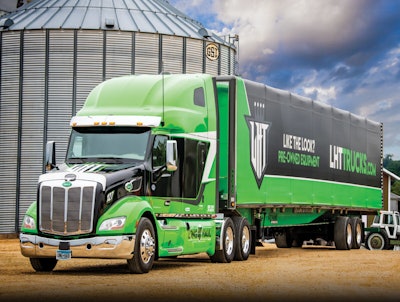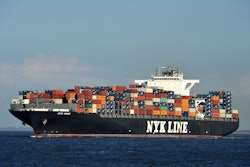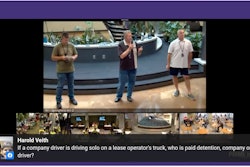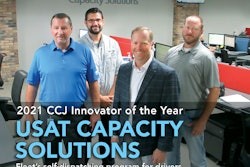
CCJ Innovators profiles carriers and fleets that have found innovative ways to overcome trucking’s challenges. If you know a carrier that has displayed innovation, contact CCJ Chief Editor Jason Cannon at [email protected] or 800-633-5953.
Revenues are up. Driver wages are up. Rates are up. It's not a bad time to be in trucking, but the groups driving the bottom line (and the trucks) often don't get to reap the benefits of a booming business, and only directly benefit when their paychecks go up.
Almost a decade ago, Long Haul Trucking (CCJ Top 250, No. 223) founder John Daniels was looking forward to retirement and there were no shortage of suitors for the 365-truck Albertville, Minnesota-based carrier. But rather than cash out and hand over the keys to the company that he spent 25 years building, he instead turned to the people who helped build it – his employees.
"The reason he did that really was because he just wanted to keep the things that he valued when it came to owner-operator pay, company driver pay, quality of equipment and things like that," said Chief Executive Jason Michels, who began with the carrier as a driver in 1999 before working in dispatch and then administration. "We still have some employees that have been here for well over 30 years and he wanted to make sure that their jobs were secure and that the Long Haul lifestyle, the brand, the image, the reputation ... that it all stayed intact."
"So, we've got company drivers with a very large six-figure balances in their ESOP account– guys who have been here since the inception," Jason Michels, Long Haul Trucking CEO
Daniels effectively sold the company to the employees – roughly 205 employees today – through an employee stock ownership plan (ESOP). Unlike a 401(k), which the company also offers, the ESOP is provided at no cost to the employee. Company performance determines the annual value.
Michels said being a wholly employee-owned company has helped drive a low turnover rate (less than 25%) and the employees who have stuck it out year-after-year have been handsomely rewarded.
"We got our [initial] valuation in 2013 in the spring – it was for the year of 2012, our first year – and our stock was valued at $8.15 cents a share in 2013," Michels said. "Spring of 2021, when our 2020 numbers came back, it was $187.32. So, we've got company drivers with a very large six-figure balances in their ESOP account– guys who have been here since the inception."
Since the overall financial health of the business determines the company's stock value and the value of employees' ESOP account, Michels said the all-in or all-out nature of the ESOP incentivizes employees to help ensure all departments are running at an optimized level and fosters a high level of teamwork.
"I think, hands down, since we became an ESOP – and the first couple of years it was new to us – but as people started getting their statements and seeing their balances and seeing how they could not only have an outcome on their own future, but also each other's future, we see buy-in and teamwork and quality culture," he said. "Here at Long Haul we've got accounting, safety, dispatch, we've even got a shop here, and it's amazing to see how our mechanics will work hard on a truck just to make sure that that driver and that truck can go get a load so that in the end, they know that the better they do those types of things, and working together, the better the ESOP does. It really is that the cultural buy-in as a team and people supporting each other, you know. It's definitely, in my opinion, the biggest win with an ESOP."
To be eligible, employees must work at least 1,000 hours per year. The amount of stock the employees receive is determined by a point system based on W-2 earnings and their number of years as a Long Haul employee.
"The more money we make [as a business] – based on how we do, based on how the industry does – that increases our share price, which employees typically get a certain portion of shares and it kind of tends to be around the same number every year," said Tiffani Steinke, Long Haul Trucking's chief financial officer, "but again, being a point system, the harder they work throughout the year, the more points they can accumulate just based on their personal payroll."
The profitability of the business, Steinke added, wouldn't necessarily affect the distribution or the number of shares to participating employees, but it would affect the value of those shares.
That the ESOP has been a tool in keeping turnover low, it's enabled Long Haul Trucking to be picky in selecting applicants.
"When we hire, we hire very selectively, but when we hire our individuals they stay here for a long time," he said, "the drivers that come onboard, whether it be owner-operator, or company, they stayed here for a long time."
Explaining how the ESOP works, and that there's no cost or employee-match, has become a vital part of the onboarding process, Michels said. But that unique element to retirement funding has also been somewhat of a recruitment tool.
"(Employees) do come for the ESOP and then when they get here, Tiffani sits down with each individual driver and goes over it on the second day of their orientation here," he said. "That definitely gets them really excited when they start seeing – when we can show them – the case studies of drivers that have been here and what the numbers look like. They start understanding they don't have to spend any out-of-pocket money for their long-term retirement. So it definitely, definitely helps."
The benefits also trickle down to Long Haul's 225 owner-operators. Since they're not actually employees of the business, contractors can't participate in the ESOP but they do benefit from the efficiencies created by employees who all have financial skin in the game for every load that leaves the yard.
"When all the support staff is working that much harder together to support each other and improve daily, the by-product of that is beneficial to the owner-operators," he said.
The CCJ Innovators program is brought to you by Comdata, Freightliner Trucks, Omnitracs and EOX Vantage.










